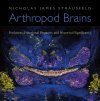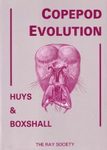By: Nicholas James Strausfeld(Author)
830 pages, colour & b/w photos, colour & b/w illustrations
![Arthropod Brains Arthropod Brains]()
Click to have a closer look
About this book
Contents
Customer reviews
Biography
Related titles
About this book
In The Descent of Man, Charles Darwin proposed that an ant's brain, no larger than a pin's head, must be sophisticated to accomplish all that it does. Yet today many people still find it surprising that insects and other arthropods show behaviors that are much more complex than innate reflexes. They are products of versatile brains which, in a sense, think.
Fascinating in their own right, arthropods provide fundamental insights into how brains process and organize sensory information to produce learning, strategizing, cooperation, and sociality. Nicholas Strausfeld elucidates the evolution of this knowledge, beginning with nineteenth-century debates about how similar arthropod brains were to vertebrate brains. This exchange, he shows, had a profound and far-reaching impact on attitudes toward evolution and animal origins. Many renowned scientists, including Sigmund Freud, cut their professional teeth studying arthropod nervous systems. The greatest neuroanatomist of them all, Santiago Ramon y Cajal – founder of the neuron doctrine – was awed by similarities between insect and mammalian brains.
Writing in a style that will appeal to a broad readership, Strausfeld weaves anatomical observations with evidence from molecular biology, neuroethology, cladistics, and the fossil record to explore the neurobiology of the largest phylum on earth – and one that is crucial to the well-being of our planet. Highly informative and richly illustrated, Arthropod Brains: Evolution, Functional Elegance, and Historical Significance offers an original synthesis drawing on many fields, and a comprehensive reference that will serve biologists for years to come.
Contents
Prologue
1. The Polymath of Rennes
2. Discoveries and Losses
3. Ramon y Cajal's Hunting Case Watch
4. Beneath the Faceted Eye
5. In the Air and under Water: The Olfactory Brain
6. The Mushroom Body Enigma
7. The Brain within the Brain
8. Eight Legs and More: Chelicerates, Myriapods, and Some Distant Relatives
9. Reiterations, Appendages, and the Ancient Brain
10. Philosophical Anatomy, Swedish Pioneers, and Neuronal Systematics
11. Convergence or Common Descent?
12. The Origin of Insects
Glossary
Notes
Acknowledgments
Credits
Index
Customer Reviews
Biography
Nicholas James Strausfeld is a Fellow of the Royal Society of London and a recipient of a Guggenheim and a MacArthur Fellowship. He is a Regents' Professor in the Department of Neuroscience at the University of Arizona, Professor of Ecology and Evolutionary Biology, and an Adjunct Professor of Art. He currently directs the university's Center for Insect Science.
By: Nicholas James Strausfeld(Author)
830 pages, colour & b/w photos, colour & b/w illustrations

























![Lebensraum Federkleid: Federn und Federbewohner Heimischer Vögel [Plumage as Habitat: Feathers of Domestic Birds and their Parasitic Residents]](http://mediacdn.nhbs.com/jackets/jackets_resizer_medium/22/225536.jpg?height=150&width=103)




![De Nederlandse Watermijten (Acari: Hydrachnida) [The Dutch Water Mites]](http://mediacdn.nhbs.com/jackets/jackets_resizer_medium/24/246499.jpg?height=150&width=105)











